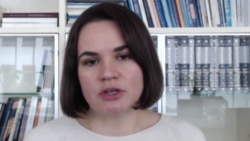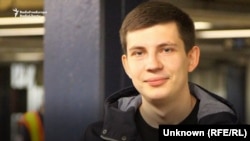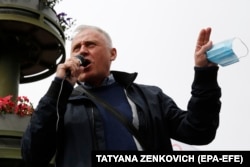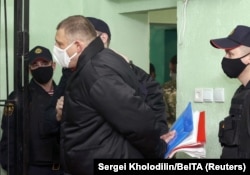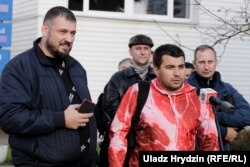In an interview with Current Time, 2020 Belarusian presidential candidate Svyatlana Tsikhanouskaya condemned the 18-year prison sentence handed down to her husband, imprisoned blogger Syarhey Tsikhanouski, on December 14 as Alyaksandr Lukashenka’s “personal revenge” for opposition to his de facto retention of power.
The sentence, delivered by a court in the regional city of Homel, is the longest given to an opponent of Belarus’ Alyaksandr Lukashenka since a sweeping crackdown began on Lukashenka’s critics after protests erupted over the August 2020 vote in which he claimed reelection as president after 26 years of rule. Belarusian opposition members, civil society, and independent media widely condemned the vote as fraudulent.
Tsikhanouski, who has been in prison since before the elections, was sentenced to a high-security prison for allegedly organizing mass disturbances, inciting hatred, obstructing election officials’ work, and organizing public disorder in Belarus.
Many Belarusians consider that Tsikhanouski’s Strana Dlya Zhizni (A Country For Life) YouTube channel sparked the protest movement against then President Lukashenka, commented Dzmitry Hurnievic, a political columnist for RFE/RL’s Belarusian Service. Aside from the 2020 elections, the channel, which has 311,000 subscribers, has probed sensitive topics ranging from COVID-19 to inept traffic police.
Svyatlana Tsikhanouskaya replaced her husband, detained in May 2020, as a candidate for president after election officials declined to register his candidacy.
Aside from Tsikhanouski, the Homel Regional Court also sentenced five other men, including Ihar Losik, a digital media consultant for RFE/RL’s Belarusian Service, to sentences of 14 to 16 years under similar charges to those against Tsikhanouski. (Current Time is led by RFE/RL, in cooperation with the Voice of America.)
The government alleges that the six men acted together to foment social unrest in Belarus – a charge the defendants’ supporters view as politically motivated.
Ihar Losik: A blogger and the creator of the Telegram channel Belarus Of The Brain (Belarus Golovnogo Mozga), one of the country’s most widely read Telegram destinations, Losik was sentenced to 15 years in a maximum-security prison for, as part of a group, allegedly inciting public animosity against officials and law enforcement and for organizing mass disorder.
Prosecutors, however, have not publicly specified the names of the individuals with whom the 29-year-old, detained in June 2020, supposedly collaborated to achieve these goals.
RFE/RL President Jamie Fly termed the five-month, closed-door trial of Losik and his co-defendants “an outrageous travesty of justice” and urged the Belarusian government “to stop their assault on news organizations and journalists and bloggers like Ihar and let him return to his wife and daughter.”
Similar appeals have come from international and Belarusian rights activists and the U.S. and EU.
In a widely distributed video statement, Losik’s wife, Darya Losik, on December 14 targeted Belarusian law enforcement and prison personnel, as well as Lukashenka, for her husband’s imprisonment. “How does it feel to realize that you have ruined the lives and fates of innocent people? Hope it hurts,” she stated.
Losik has twice staged hunger strikes and reportedly once attempted suicide while in custody,
Dmitry Popov and Artyom Sakov: The social-networks moderator, Dmitry Popov, and camera operator, Artyom Sakov, for Tsikhanouski’s A Country For Life channel both received 16 years in a maximum-security prison colony. Sakov was filming Tsikhanouski at the time of his detention in May 2020. Popov, a Russian citizen, is believed to have been detained in early June 2020, after he published a video noting the security forces’ alleged interest in him.
Mikalay Statkevich: A veteran of political clashes with Lukashenka, 65-year-old Mikalay Statkevich is the leader of the unregistered Belarusian Social Democratic Party and a 2010 presidential candidate who opposed Lukashenka for office. Kept in solitary confinement, Statkevich was sentenced to a 14-year jail term for supposedly recruiting others to destabilize Belarus and using the Internet to urge Belarusians to take “radical actions.”
Syarhey Tsikhanouski: Along with Losik, arguably the best known of the co-defendants, 43-year-old Tsikhanouski was detained in May 2020 while gathering signatures for registration of his wife’s presidential candidacy for supposedly staging an unauthorized public event.
A longtime, outspoken critic of Lukashenka, he reportedly stood with his back to the judge as the sentences against him and his five co-defendants were read out on December 14.
Tsikhanouskaya told Current Time that her last direct communication with her husband was a phone call 14 months ago. “In the time since, not a single one of my letters to him or his to me have reached us,” she said.
Letters from the couple’s two children reach Tsikhanouski, but any additional communication now occurs through a lawyer, Tsikhanouskaya added.
Rights activists and Western officials view the charges against Tsikhanouski as retribution for his wife’s status, among much of the international community, as Belarus’ legitimately elected president.
But the Belarusian government dismisses such criticism. It sees the judgement against Tsikhanouski as just. Rather than 18 years in prison, prosecutor Denis Mikushev commented, the blogger could have received a 20-year sentence, the maximum allowed, the state-run BelTA news agency reported.
Uladzimir Tsyganovich: Another blogger, Tsyganovich, who made videos on socio-economic issues for the YouTube channel MozgOn (BrainOn), was sentenced to 15 years in a maximum-security prison. He has been in pre-trial detention since June 2020.
All of these defendants must pay around 2.5 million Belarusian rubles (roughly $986,000) in compensation for unspecified damage done to an unnamed victim or victims.
An appeal of the sentences can be filed within 10 days.
The lengthy sentences handed down to Tsikhanouski and his co-defendants could reflect Lukashenka’s desire to revenge the tumult that shook his hold on power or as “a way to scare everyone” and silent public criticism of the government, Hurnievic said.
But the government maintains it is just ensuring public order. Addressing regional officials, Lukashenka on December 14 stressed that the country must not return to the upheavals of 2020, but urged law-enforcement not to “overdo it.”
International human rights organizations and Western governments consider all these defendants, who deny the charges against them, to be political prisoners.
In an official December 14 statement, U.S. Secretary of State Antony Blinken reminded Belarus of its obligations to conduct fair trials as a member of the Organization for Security and Cooperation in Europe.
“Regrettably, these sentences are further evidence of the regime’s disregard for these international obligations as well as for the human rights and fundamental freedoms of Belarusians,” Blinken said. “The Belarusian people deserve better.”
The European Commission’s foreign policy spokesman, Peter Stan, condemned the sentences as “part of the ongoing brutal and systematic repression of all independent voices in Belarus” and warned of potential additional sanctions against Belarus.
Belarusian legislators appeared to anticipate such a response. The country's parliament on December 14 passed a law that will make calling for sanctions against Belarus a criminal offense punishable by a 6 to 12-year prison term.
Expatriate opposition figures, including Tsikhanouskaya, are among those who have urged international sanctions against Minsk for the government’s alleged violations of civil and human rights.
But Belarus’ planned penalties for such appeals do not appear to have had their desired effect.
Referring to Lukashenka as “the dictator,” Tsikhanouskaya tweeted in English on December 14 that her husband’s sentencing will not deter Belarus’ scattered opposition movement.
“[H]e hopes to continue repressions in silence,” she said of Lukashenka. “But the whole world watches. We won't stop.”




